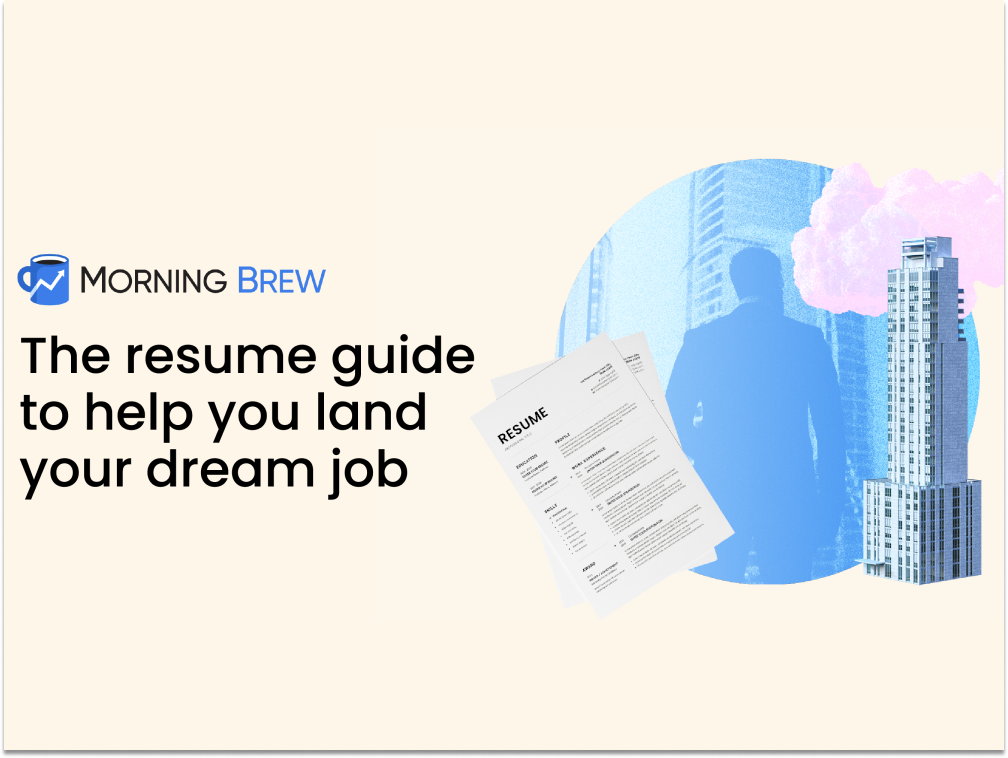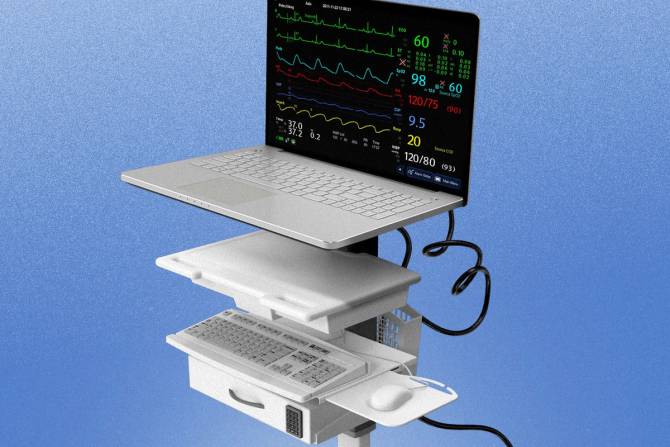Happy Wednesday! The theme of the day at the annual HIMSS conference is how nontraditional stakeholders, like virtual care providers and hospital-at-home programs, are changing the healthcare system. Maia will be on the ground in Chicago to get the latest. If you’re attending the conference and have something interesting to share, drop her a line via email or LinkedIn.
In today’s edition:
 ️ Hospital marketing ️ Hospital marketing
 Outpatient care Outpatient care
 Data engineering Data engineering
—Maia Anderson, Shannon Young, Billy Hurley
|
|
(Typically) on Fridays, we schedule our rounds with Healthcare Brew readers. Want to be featured in an upcoming edition? Click here to introduce yourself.
This week’s Making Rounds spotlights Devika Mathrani, chief marketing and communications officer at NewYork-Presbyterian, the second-largest health system in New York City by annual net patient revenue. Mathrani, who leads a team of just over 100 people, spoke about the changing dynamics of healthcare marketing as the industry becomes more consumer-centric.
This interview has been lightly edited for length and clarity.
What’s the biggest misconception people have about your job?
When people see “chief marketing officer,” they immediately think about advertising. There is so, so much more than just advertising…So much of it is about how you take the brilliant information and knowledge that our nurses and our physicians have and make it approachable and attainable for consumers in their daily lives…The marketing team is thinking about every patient communication. Like, when you arrive at your appointment, what does the greeting feel like?...You’re almost a chief customer officer in many, many ways.
What would you consider your biggest accomplishment during your time at NewYork-Presbyterian?
One of the things I’m most proud of is the reinvention of the brand…The old brand was “Amazing Things are Happening Here,” which felt a little bit more insular. It was talking a little bit more about us, and it wasn’t bringing the customer into the story. I felt that for all of the innovative things that we wanted to do—whether it was launching a new podcast or redoing our content programs, or relaunching our social channels—it needed to be done with the customer at the center of everything.
Keep reading here.—MA
Do you work in healthcare or have information about the industry that we should know? Email Maia at [email protected]. For completely confidential conversations, ask Maia for her number on Signal.
|
|
Ready to land your dream job? It all starts with a killer resume. But crafting one that truly stands out can be a daunting task. That’s why we’ve created the ultimate guide to building a strong and effective resume.
Our guide is jam-packed with practical tips and real-world examples to help you craft a resume that will impress even the toughest hiring managers. We'll show you how to highlight your skills and experience in a way that makes you stand out from the crowd. So if you're ready to take your career to the next level, download our guide today.
|
|
Diane Labombarbe/Getty Images
Hospital outpatient departments are more likely than independent doctor offices and ambulatory surgical centers to treat patients from populations the American Hospital Association (AHA) says are “medically underserved”—and many have complex medical conditions, according to a new study.
A late-March AHA report found that Medicare patients who received outpatient care at hospitals were more likely to be lower income, non-white, and “burdened with more severe comorbidities or complications,” compared to those treated in other facilities. They were also twice as likely than those treated in independent physician offices to have received care in an emergency department or hospital in the previous 90 days.
And about one-third (31%) of Medicare recipients enrolled in the federal insurance program due to disability or end-stage renal disease were treated in hospital outpatient departments, compared to 19% who got care at an independent physician office, according to the study, which KNG Health Consulting, a Maryland-based firm, conducted for the AHA.
AHA President and CEO Rick Pollack said in a statement that while hospitals serve “the sickest patients and those left behind economically in our communities,” Medicare reimburses facilities “less than the cost of providing care”—84 cents for every dollar spent on care, according to 2020 AHA survey data.
AHA executives have criticized “site-neutral” payment policies, which seek to align reimbursement for services, arguing that they “fail to recognize the legitimate differences in the types of services hospitals provide.”
Methodology: The study covered the period between 2019 and 2021, and “aligned beneficiaries to the setting where they had the most ambulatory care claims.” It did not include Medicare Advantage plan beneficiaries. A different classification method for patients “could potentially yield different results,” the authors noted, adding that the Covid-19 pandemic “may have skewed patient and clinical characteristics.”—SY
Do you work in healthcare or have information about the industry that we should know? Email Shannon at [email protected]. For completely confidential conversations, ask Shannon for her number on Signal.
|
|
Natalia Gdovskaia/Getty Images
Nasim Eftekhari thinks healthcare could use a few more data engineers—the kinds of professionals who know how to work with the predictive models supporting California’s City of Hope medical center, where she oversees applied AI and data science.
With the help of AI, City of Hope patients can be continuously monitored for surgery complications, like sepsis or infection. The analytical models pull from the facility’s electronic-medical records system, known as Epic.
“These models are continuously monitoring patients, and if there is a risk, if there is something that needs to be done, there is a notification that pops up inside Epic, in a physician’s working environment, and they get to take action,” Eftekhari told IT Brew.
While some AI applications are already in effect at City of Hope, other “moonshot” ones are in the works, like using models to closely watch cells for early signs of cancer.
Whether moon-bound or Earth-bound AI, Eftekhari told IT Brew about the AI-specific skills that are in demand—and how to acquire them.
Keep reading at IT Brew.—BH
|
|
Francis Scialabba
Today’s top healthcare reads.
Stat: Black residents in counties with more Black doctors had much better health outcomes and life expectancies. (Stat News)
Quote: “She probably would have continued to wither within herself. I think she would have been a stay-at-home person and a recluse.”—A woman in Missouri on her daughter, who has Down syndrome and could not get a quick and accurate diagnosis of a traumatic brain injury due to her genetic disorder (NBC News)
Read: CoolSculpt, a body-contouring and fat reduction treatment, has “considerably higher” patient risks than manufacturer estimates, according to a New York Times investigation. (the New York Times)
|
|
-
The most important thing you’ll see all day: Pedro Pascal as at-home diagnostic tests.
-
Psychedelic drugs may be able to treat symptoms of long Covid.
-
Merck is the latest biotech company to jump in on the mergers and acquisitions frenzy, buying Prometheus Biosciences for $10.8 billion.
-
Data from a therapeutic cancer vaccine clinical trial shows promising results.
|
|
Catch up on the top Healthcare Brew stories you may have missed:
|
|
|
Written by
Maia Anderson, Shannon Young, and Billy Hurley
Was this email forwarded to you? Sign up
here.
{if !contains(profile.lists,"Marketing Brew") || !contains(profile.lists,"CFO Brew") || !contains(profile.lists,"HR Brew") || !contains(profile.lists,"EmTech Brew") || !contains(profile.lists,"IT Brew") || !contains(profile.lists,"Retail Brew") || !contains(profile.lists,"Healthcare Brew")}
Take The Brew to work
{/if}
{if !contains(profile.lists,"Marketing Brew")}
-
Marketers:
{if !contains(profile.lists,"Marketing Brew")}
Marketing Brew
{/if}
{/if}
{if !contains(profile.lists,"CFO Brew") || !contains(profile.lists,"HR Brew")}
-
Corporate:
{if !contains(profile.lists,"CFO Brew")}
CFO Brew
{/if}
{if !contains(profile.lists,"HR Brew")}
HR Brew
{/if}
{/if}
{if !contains(profile.lists,"EmTech Brew") || !contains(profile.lists,"IT Brew")}
-
Tech:
{if !contains(profile.lists,"IT Brew")}
IT Brew
{/if}
{if !contains(profile.lists,"EmTech Brew")}
Tech Brew
{/if}
{/if}
{if !contains(profile.lists,"Retail Brew")}
-
Retailers:
Retail Brew
{/if}
{if !contains(profile.lists,"Healthcare Brew")}
-
Healthcare:
Healthcare Brew
{/if}
{if !contains(profile.lists,"Daily Business") || !contains(profile.lists,"Money Scoop") || !contains(profile.lists,"Money With Katie")}
Get smarter in just 5 minutes
{/if}
{if !contains(profile.lists,"Daily Business")}
-
Business News:
Morning Brew
{/if}
{if !contains(profile.lists,"Money Scoop") || !contains(profile.lists,"Money With Katie") || !contains(profile.lists,"Raise")}
-
Money & Career:
{if !contains(profile.lists,"Money Scoop")}
Money Scoop
{/if}
{if !contains(profile.lists,"Money With Katie")}
Money With Katie
{/if}
{if !contains(profile.lists,"Raise")}
Raise
{/if}
{/if}
Business education without the BS
Interested in podcasts?
|
ADVERTISE
//
CAREERS
//
SHOP
//
FAQ
Update your email preferences or unsubscribe
here.
View our privacy policy
here.
Copyright ©
2023
Morning Brew. All rights reserved.
22 W 19th St, 4th Floor, New York, NY 10011
|
|







